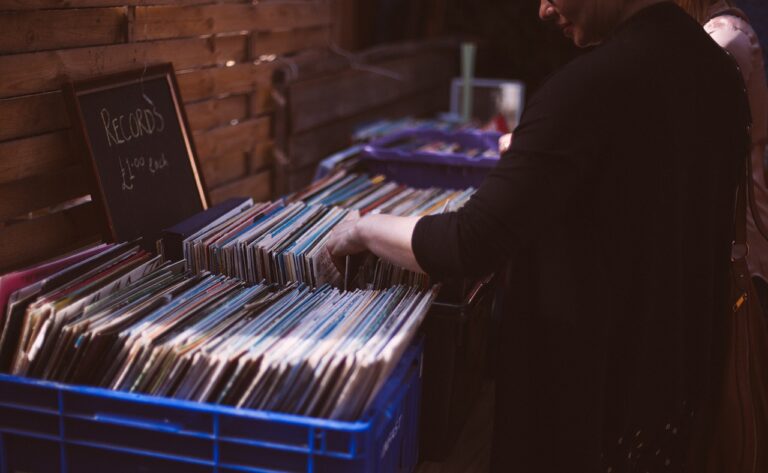Are Record Labels Worth It?
Behind every classic story of a mega-successful artist, be it Queen, Lady Gaga, or Metallica, is the presence of a record label. Sometimes the record company is a dominant force behind the artist’s success. Other times, the record company is a bona fide villain.
Back in the day, a record label was near essential for a successful music career. Nowadays, you have more choices as a rising musician, but all have their pros and cons. So, are record labels worth it?
Record labels are worth it for some artists and bands but not for others. Determining if this approach is worth it for you depends on the type of music career you’d like to build. Major record labels offer massive growth potential but compromise creative control.
Before you sign any binding contracts, its vital to explore your options. Furthermore, the ultimate question is: what do you value? After reading, we hope you’ll have a clearer understanding of what a record label can — and cannot — offer you as a client.
Contents:
- Differences Between Major and Independent Record Labels
- The Three Major Record Companies
- Large Labels and Indie Labels: More Pay or More Freedom
- Signing a Record Label versus Staying Solo
Differences Between Major and Independent Record Labels
Just like any business, record labels have strong financial incentives. Also like any other business, record labels come in various sizes from “small scale” to “industry titan.” Some of the advantages (and disadvantages) of shopping at a local business versus Walmart and Amazon, for example, also apply to record companies.
Let’s start with some key points regarding the major players.
There are 3 Major Record Companies
“The Big Three” of the recording industry include Universal, Warner, and Sony. If you have a physical music collection, you’ll see these names frequently on album and CD covers.
You could say what’s going on here is a triopoly (or something resembling one). There are alternatives, as we’ll discuss, but there’s no doubt that Sony, Warner, and Universal dominate. Furthermore, other record labels can’t compete with the scale and leverage these companies provide.
Furthermore, these companies own several smaller companies, many of which may appear as unaffiliated independent labels. For example, Universal owns (to name a few):
- Def Jam Recordings
- Island Records
- Bravado
- Capitol Music Group
Warner oversees many subsidiaries, including:
- Atlantic Records
- Bute Sound
- A.P. Schmidt
- Eleksylum Music
- Big Beat Records
- Bulldog Entertainment Group
And Sony has their reach into countless industries including photography, video games, movies, and of course the record business. These are just a few who answer to Sony:
- Columbia Records
- RCA Records
- Legacy Recordings
- Masterworks
- Epic Records
- Arista Records
You can Google “Warner (or Sony or Universal) music subsidiaries” for a more comprehensive view of how massive these brands truly are. It also helps if you’d like to sign with a small, indie record label and know whether or not they’re truly independent.
Large Labels Offer Higher Pay; Smaller Labels offer More Freedom
When deciding between small and indie record labels, there is both a draw and a caveat to each.
A larger label is more influential. Thus, they can pull more strings to get your music to more audiences. This is why despite the rise of independent labels and self-production large record labels remain… large.
Furthermore, the access to connections is unmatched with a large label. There’s no doubt Sony, Warner, and Universal each (own?) manage countless celebrity musicians. This isn’t to say you’ll meet them right away, but you may be surprised with how powerful such connections prove to be.
On the other hand, small and independent record labels (also called indie labels) won’t demand as much control over your music. Sure, the financial prospects might be slimmer at first. However, many musicians seek a creative outlet which, ideally, provides income.
Those who sign with major labels may give up more control than they anticipated. This can be an unpleasant shock, even if the money flows like water (which it may or may not do). Otherwise, it can take significant wealth to truly not care about losing creative control — and this is what frequently happens with famous musicians.
Despite everything, indie record labels have surged in popularity. Online streaming and social media has propelled this growth as it is now easier than ever to start a record label or become a one-person production.
Which begs the question: are record labels — large or small — even worth it?
Signing a Record Label Vs Staying Solo
It is clear that record labels haven’t gone anywhere. Even the traditional “sell your soul” type corporations still make a killing off of new successful pop artists. But the industry is more diverse than ever. Becoming a fulfilled and well-compensated artist does not require signing a record label as it once did.
Instead, signing a record label is as much a choice as deciding on a musical style. Just the same, some styles are in greater demand (and make more money) while others might be more niche (but offer greater satisfaction to certain people).
Reasons a Record Label Isn’t Worth It For You
You don’t need a record label. In many cases, they are more of a burden than a boost.
Here are some signs that a record label is not worth it for your music career.
You’re a Part Time Musician
Many musicians are part time and don’t desire the stress of a record company breathing down their shoulders. While it may seem that self-production sucks up more time than outsourcing the job to a label, this isn’t always true.
If you don’t see eye to eye with your record label, you could end up in lengthy disputes. Furthermore, artists can find themselves caught up in a heated, competitive environment.
Ultimately, a record contract can be a big commitment for someone who has other things on their plate, such as another career.
You Want to Focus on the Music
Record companies are businesses. As businesses, they require revenue and profits. Thus, the intention of both parties when a record contract is created is to monetize the music to the highest degree possible.
This can be a great thing if income is your number one goal. Unfortunately, the music you like to make might not align with what’s the most profitable. Most big labels will adamantly try to change that — even if it means substantially altering your work.
As an independent artist, you aren’t beholden to anyone else’s ideals. You alone decide what gets produced and distributed. In some cases, you might make a wiser decision than a record company who may, from time to time, misjudge how successful a song will be.
Full Musical Ownership is Important to You
When you sign with a record label, you’ll usually have to sign away some of your rights to your music. It’s the same as when a small business brings in an angel investor instead of funding itself exclusively with profits and owner capital.
So while you have more income potential with a record label, you still need to pay. The payment is partial ownership.
If you don’t like the idea of another entity being able to control your work, then signing with a record label is not for you. Staying independent ensures that you are the only one who makes executive decisions about your songs. This is extremely freeing.
You Desire 100% of the Profits
Sure, you might make less going at it alone compared to signing a record label (although not always). However, the good news is that you’ll keep everything you do make.
No third party is contractually allowed to dip their fingers into your revenue stream. It’s all yours.
Furthermore, who says you don’t know how to turn a sizeable profit with your music? While record companies specialize in this sort of thing, many talented musicians have great business sense — sometimes more so than most labels. If you thrive as an entrepreneur, you might get to keep all the profits — and earn more gross revenue.
Reasons You Should Sign a Record Deal
Creative freedom is a major pro when it comes to self-publication. But if record labels were useless, artists would catch on and they’d soon cease to exist.
The truth is that record labels continue to offer excellent perks to their clients. While there are more options than ever when it comes to your music, there remain several key areas where record labels excel.
Below are indications that a record deal is actually a great idea.
Maximizing Profits is a Priority
Solo artists cannot compete with record labels when it comes to connections. Record companies have been in the music game a long time. Consequently, they’ve established many lucrative contracts with the world’s biggest stars.
This is especially true with the big three (Sony, Universal, and Warner) who wouldn’t be so big if they didn’t have a ruthless monetary strategy propelling them and their clients. Even indie record labels can (probably) pull more social strings than you can if you seek a middle ground.
Additionally, record labels have fully-staffed marketing departments ready to spread the word. You don’t have to waste time doing it yourself.
All in all, while record labels will want a slice of the pie in the form of partial musical ownership, the income ceiling is nearly nonexistent.
You Don’t Want to Handle the Business Side of Things
For those serious about revenue, songwriting is only a portion of a musician’s workday. If you want to make significant income, you’ll need to research, promote, arrange live shows, and much more.
Record labels handle a lot of these things for you if you sign. You worry about music production (heck, sometimes you don’t even need to do that) and the rest will be taken care of by devoted teams.
Just remember that this work isn’t free. A portion of what your music brings in will go towards others who made your album/s successful.
The Opportunity to Meet Other Artists is Appealing
Record labels, especially larger ones, handle countless musicians. While this might not be great for personalized service, it’s amazing for networking opportunities.
Again, signing a contract with Warner, Universal, or Sony ensures that your talent will be managed by an organization that handles hundreds of famous songwriters, many of which serve as your musical inspirations.
Perhaps one day you’ll be featured — or feature — your longtime idol. If you’re looking to do a collab at some point in your career, record labels really open the door.
Access to a Larger Budget
Hate to break it to you, big record labels have more money than you. A lot more money.
Fortunately, this means that you can access their sizeable budget to make truly compelling tracks with access to cutting-edge music production tech. A high-quality recording can elevate a track to the next level, even if the notes remain the same.
Money can do a lot more than produce better-sounding recordings. Marketing and promotion massively increases revenue, but the initial costs can seem insurmountable for wholly independent artists. Record labels, on the other hand, have plenty to spend — and will willingly do so for a track they believe has earning potential.
How Hard is it to Get a Record Deal?
If you are leaning towards getting a record deal, be it a large or indie label, you’ll need to convince them to take you on. Large labels have especially tough standards as competition is high.
It is vital that you present an alluring musical portfolio. But how hard is this to do?
It depends on who is evaluating your music. Some labels have different goals. If you’re pushing a hip-hop album to a record company prioritizing country music, you’ll face steeper odds than going elsewhere where your music will be more appreciated.
Ultimately, you need to produce great music. Great music is appealing to all record labels and will put you a tier above the mediocre artists that bombard them with “meh” tracks. Thus, the hardest part of getting a record deal is both:
- Researching the right company
- Developing your music skills and portfolio.
There you have it.
Types of Record Deals
Record deals aren’t for everyone, but there are many arrangements that are worth considering.
Many of these deals focus on the essentials, meaning CD and album production are omitted in favor of digital distribution (cutting expenses significantly).
What is a 360 Record Deal?
The 360 record deal is the most intensive type. In this case, the record label assumes great control of your music. Revenue is the goal, even if it means seizing creative control from you, the artist.
“Well, this sounds crappy,” you might say. Believe it or not, there are benefits. The 360 deal is, by far, the most hands-off music contract you can get. You (more or less) don’t need to worry about anything as long as you keep the music coming.
What is a P&D Deal?
Virtually the opposite of a 360 deal, a P&D (pressing and distribution) covers distribution. The musician is left to do everything else, from promoting their music to arranging live shows.
While it sounds lazy, distribution is a big job. Plus, it offers a means for the artist to keep their profits while being able to outsource one of the most time consuming jobs.
What is a Licensing Deal?
Typical with indie label firms, a licensing deal allows the musician to maintain ownership. However, the label receives permission to use the music as they wish.
Afterward, the copyright holder (the songwriter) receives their fair share of royalty payments.
What is a Profit Share Deal?
A profit share deal is a classic 90/10, 80/20, 50/50 (or whatever ratio) split between the artist and the label.
Profit share deals have fallen out of popularity recently due to negative press. The idea of a record label getting a payment for doing very little has struck people as being a bit… questionable. Even the animated series South Park criticized this kind of deal as the main characters brainwash a musically gifted acquaintance to give them 10% of his performance earnings — despite doing nothing.
Profit share deals aren’t always a bad thing, though. It just depends on the record label’s practices.
Conclusion
Are record labels worth it? In an age where self-releasing albums is more doable than ever, many musicians are questioning if they should give up musical ownership to a third party.
Indeed, record labels aren’t for everyone. Those who want to keep all their profits and maintain full creative control are wise to avoid them altogether.
However, this doesn’t mean record labels are no good. Many people want to make as much money as possible with their music. There’s no shame in this, and record labels will do their best to make this happen. Furthermore, the industry connections you’ll get by signing a record deal are irreplaceable.
As you can assume, this all comes down to you as an artist. Are you looking for unhindered creative fulfillment without anyone breathing down your neck? Or would you rather outsource some of the most demanding parts of your music career to a qualified organization?
Only you can decide what’s best for you.









